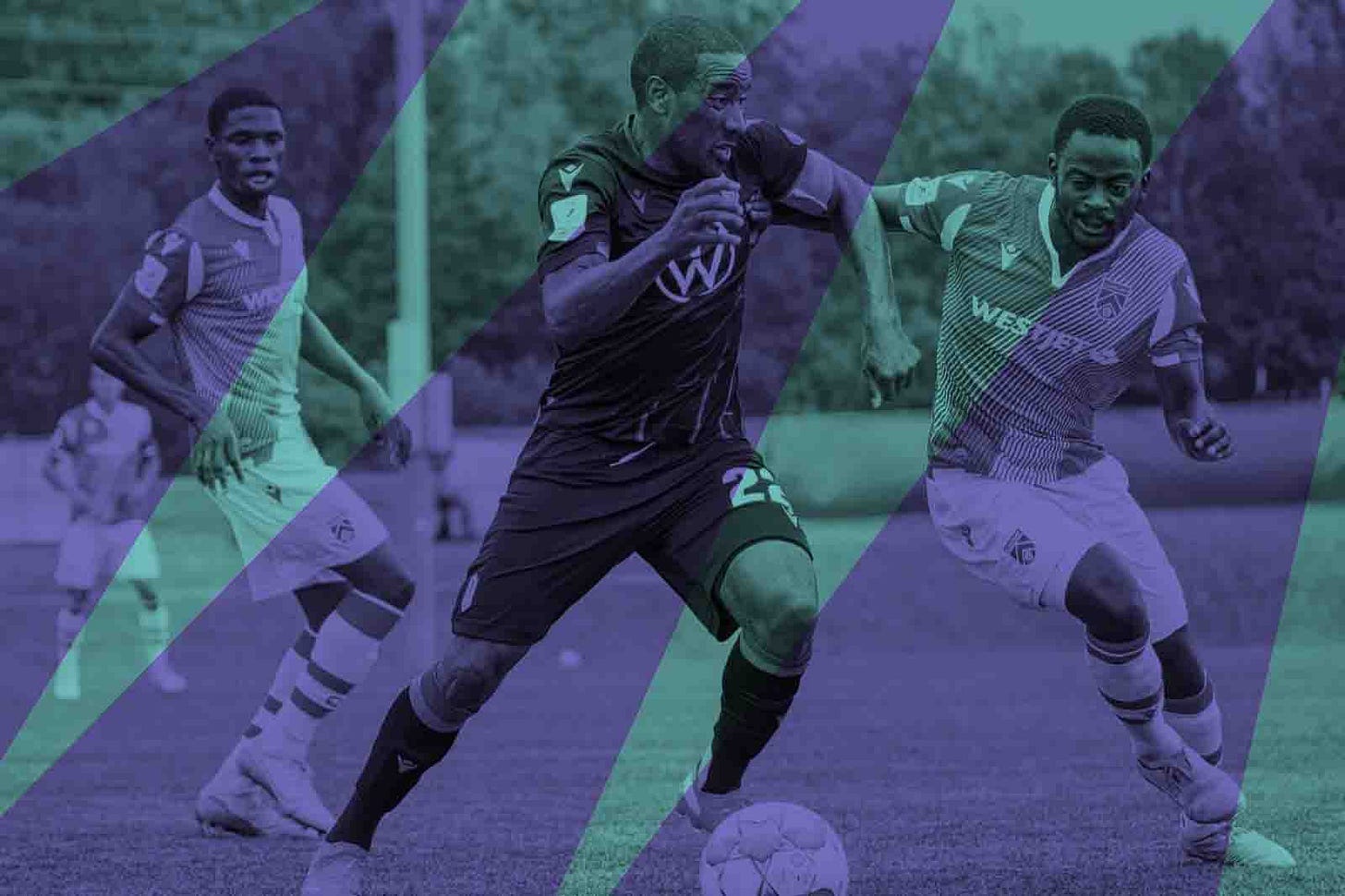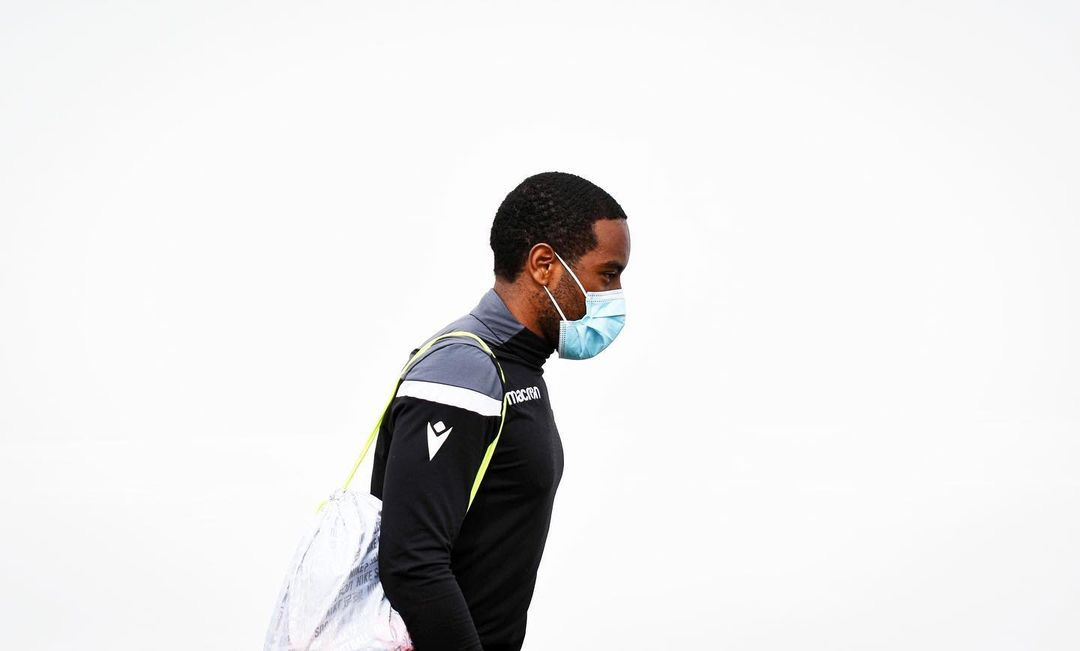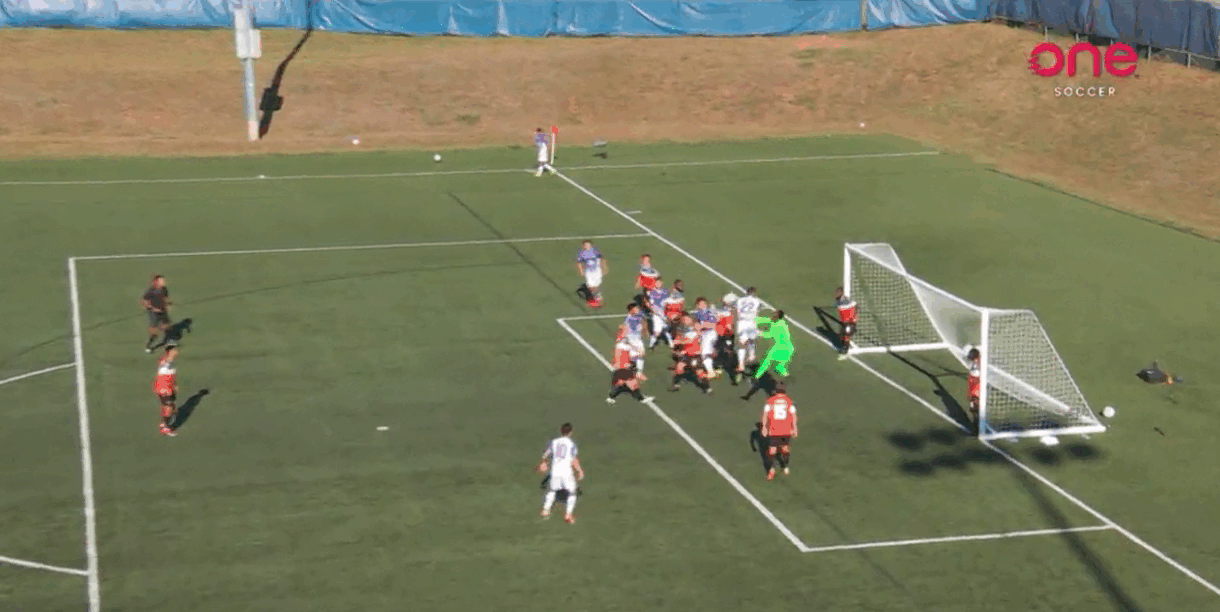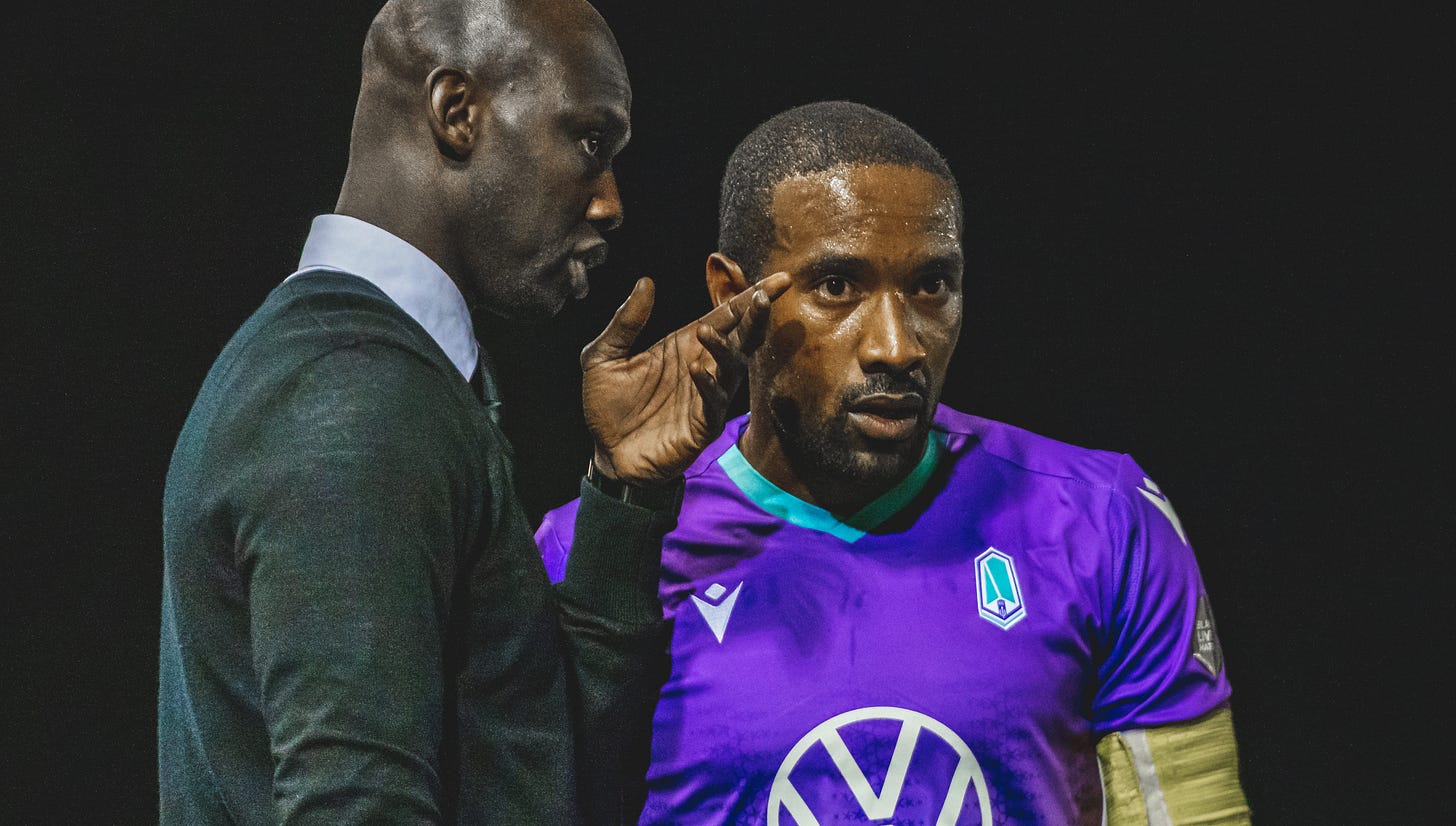'Lead by example': One-on-one with Pacific FC captain Jamar Dixon
Leadership expectations, lessons learned from Julian de Guzman, and becoming the elder statesman: Dixon readies himself for 2021
When Jamar Dixon was still with the Ottawa Fury, he was given a few words of wisdom about leadership from Canada’s most-capped men’s national team player:
“[Julian de Guzman] always said, ‘don’t be a captain that [expects things to be] your way or the highway. Be a captain for the boys. Get an understanding of all your players, because everyone’s different.’”
In his second year with Pacific FC, the 32-year-old midfielder is getting used to a leadership role. Already one of the few veterans on last year’s Island Games roster, Dixon has now become the club’s elder statesman. He’s also taken on the coaching reins of the Van Isle Wave’s U-13 club.
If 2020 was a step forward for Pacific, 2021 represents heightened expectations. Title aspirations loom. Dixon isn’t shying away from the responsibility.
“I just want to be more vocal,” he said. “More of the guy that’s going to click the team together and understand that we’re in a battle as one.”
As his club prepares to kick off in Winnipeg, I spoke with Dixon about leadership expectations, tidying up the past season’s mistakes, and being the club’s voice on the pitch.
This interview has been lightly condensed for clarity.
You’ve got a new role this season, taking on the captain’s armband. What does that mean to you as a player?
JD: It’s a great accomplishment, for sure, being able to step into that role and help the team. It means a lot. Obviously, it shows that the club trusts you from the top down, and the players and coaches as well. For me, it’s been a pretty good transition. I’m just trying to continue to understand the players and learn from one another, because at the end of the day, we’re all one, right? It’s just a matter of sharing our knowledge and experience to help the next person.
How do you respond to the expectations that [captaincy] comes with?
JD: I mean, I don’t really look at the expectations. I just think that if you’re a professional, and you do what you’ve gotta do on the daily—and just from the experiences I’ve had as a player—I just think that has to be the number one focus. Because first and foremost, you’re still a player, and you’ve got to lead by example. That’s really all it comes down to for me.
One consequence of Marcel de Jong retiring—and this happens to any player lucky to play for long enough—is you’re taking on the reins of the elder statesman on this team. There are no other thirty-somethings left.1 How does it feel to be that voice in the locker room?
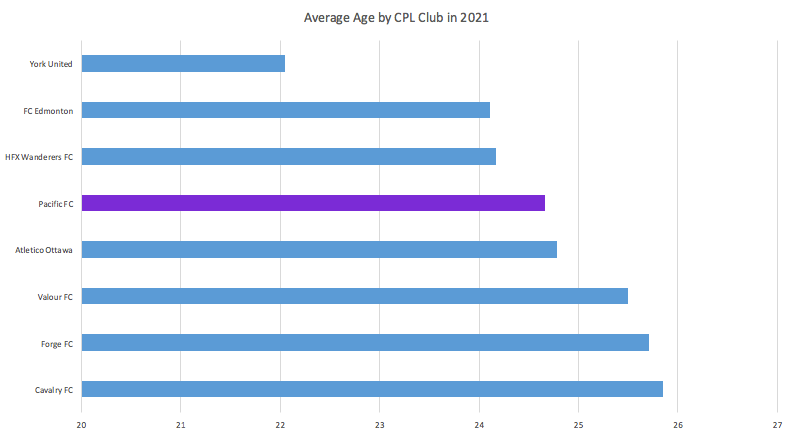
JD: You know what? It is different, but the way I like to do things is I want everyone to have a voice. Because the more you know about a squad, the better you can move together as a team. So there’s times where I’ll let the guys speak and share their opinions, and then there’s other times where it’s just, you know, “okay boys, this is what it is, there’s nothing around it: this is how we’ve got to attack the game,” or sometimes you’ve just got to be a bit more stern with certain things. But that also comes down to respect—[commanding] and earning respect. And I think I do a decent job of that.
“I want everyone to have a voice. Because the more you know about a squad, the better you can move together as a team.”
I’m still learning; I’ve still gotta get used to… this is a new era, to be honest with you. The younger guys coming up, it’s different than when I was younger and how [captains] were with me. That’s one thing I’ve noticed where there’s a bit of adapting there. But that’s okay. That’s all part of the learning process. And with this team here, it’s a great transition. Everyone’s willing to help, and it’s always positive.
Throughout your career, are there leaders or captains you’ve had that you can take cues from? Someone who made you think, “that’s how I want to do it, too”?
JD: Yeah, there’s one person that stands out: Julian de Guzman. He taught me a lot [at Ottawa Fury].2 He always said, “you know, you’ve done this well, but you can do it better.” He always wants someone to do it better than him—and take little notes from him, but try to be better at it. And that’s just one of the things that I’m going to try to do [in my own] way.
But most importantly, he always said, “don’t be a captain that [expects things to be] your way or the highway. Be a captain for the boys. Get an understanding of all your players, because everyone’s different.” You can approach certain players a little more tougher than other players. It’s all about the chemistry of the unit; it’s all about the vibes of the team. That’s one crucial part, for sure.
“[Julian de Guzman] always said, ‘don’t be a captain that [expects things to be] your way or the highway. Be a captain for the boys. Get an understanding of all your players, because everyone’s different.’”
And then in Europe,3 I had a couple other guys who were great influences on me as well. But the main thing I would say, coming back to North America and actually taking the time to understand your teammates, I think that’s a priority.
Coming into this club last year, you were thrust into completely unprecedented circumstances. Every team in the league had to adjust to COVID-19 and find ways to carry on in their training. You expected, before the season, you’d be playing games in front of the fans at Starlight Stadium. Instead, you’re doing Zoom workouts and then off to PEI for a bubble tournament. What was that like for you, getting adjusted to a new city, a new team, and finding your footing in the midst of all this?
JD: Well, the focus is always the game, right? It is going to be tough playing with new players and not really getting the chemistry down, but I would have to give it to the coaching staff, because they were extremely influential with how we moved forward. They were contacting us even when we were locked down; we were having meetings daily; we were doing activities through Zoom—just a lot of little things to keep us together. And that made it a little easier when it came time to play together as a team.
It’s definitely tough during this COVID time, but you’ve got to also dig deep and be like, “I’m a professional; this is what I’m here to do.” Everything goes out the door when you’re on that pitch and the whistle blows. Maybe you’re not going to be as sharp, but you still have to have that mentality to take it to the next step, the next level.
One thing you wrote last August: “I’ve watched everyone on this squad sacrifice a lot to be where we are today.” How did the season shape team morale and being able to build an identity together?
JD: Yeah. These boys here, it’s a young squad, but these guys, they worked super hard, man. They really want it. And they’re not far off. It’s just a matter of a little more experience [and] just tightening up the little things. They’re extremely determined to go further, and I think that’s also what keeps me going as well, because these guys are challenging me daily.
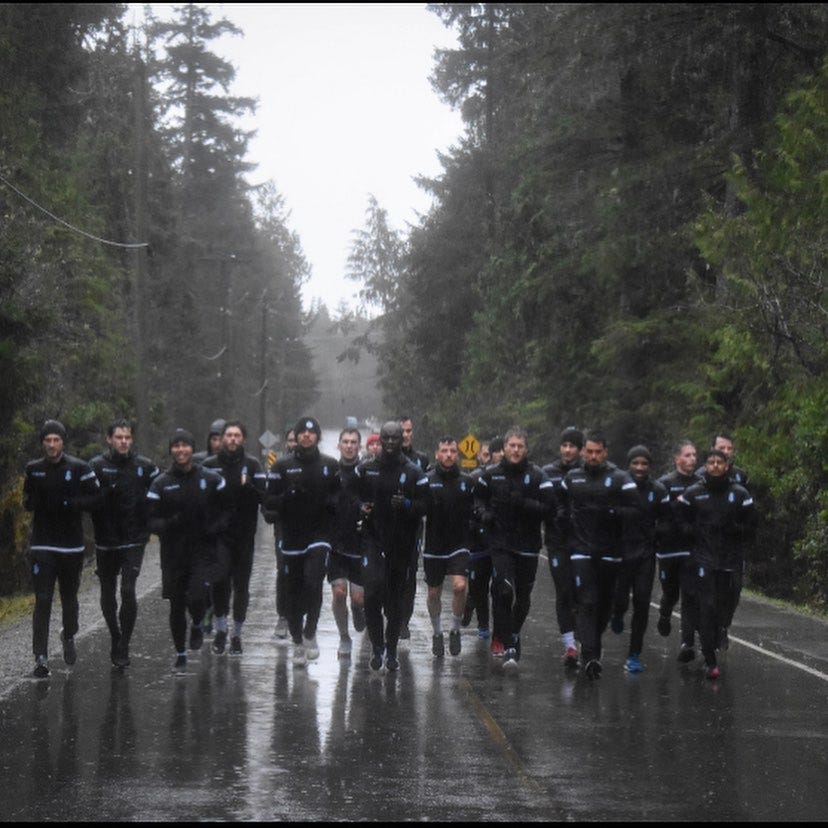
That’s why when I say I’ve seen everyone grind, like, we had a little preseason before [the pandemic started], and we were buzzing, everyone was ready to go. And then obviously COVID hit, but again, it was more of a mindset. Like, this team is showing that they believe, that they want something. And it wasn’t just the coaches pushing it; it was themselves. That was a big sign to me. “Okay, if you guys are going to take it seriously and push, then there’s no choice [for me] but to do the same or more.”
So you went off to PEI together and made it to the playoffs and a fourth-place finish. How do you look back on the Island Games and how Pacific fared?
JD: I thought it was really good for Pacific. Looking at all the games, there were a lot more positives than negatives—especially taking the jump from where they were [in 2019] to where we finished last year. I think we could’ve definitely done more, but I think that was the right adjustment for us at the time. There’s still some room to work on, and that was evident, but it showed what the team is capable of in such a short period of time. Maybe if the season was longer, things would be different; maybe we’d be able to adapt better. But I think we fared fairly well considering COVID and what happened in the previous year.
In a shortened season, and with a smaller sample size, certain things are going to stand out more than they might over the course of a longer regular season. Two areas stood out for Pacific: conceding penalties and late-game goals. How do you, as a club, tighten up in those areas?
JD: That, obviously, comes down to just discipline. Giving away PKs, the amount that we gave away... it’s not just the person that gave away the PK, it’s the chain of events. But if we’re cleaner in these areas, these things don’t happen, right? If we stay on our feet in the box instead of sliding, you have less chance of these things happening. Obviously, the ball hits your hand, that’s normal—it happens to anybody in the world. That’s unlucky. But some of the stuff we were doing was a bit forced. And I think it was just jitters, right? We didn’t really get that many games—we didn’t get any preseason games. For all the seasons I’ve gone through, I’ve at least had five, six games prior to playing that first [regular season] game. So I think maybe that might’ve been a bit of nerves for the guys.
“It’s not just the person that gave away the PK, it’s the chain of events. But if we’re cleaner in these areas, these things don’t happen, right? If we stay on our feet in the box instead of sliding, you have less chance of these things happening.”
In terms of the late goals, that’s another thing that you’d [normally] tidy up in preseason. Maybe if we had a preseason, those things get corrected, and then we go on to the tournament and are aware of those details. But that’s definitely something we’re going to work on. And that just comes with time and games.
What goals did you set for yourself over the offseason?
JD: One thing I really wanted to do, I just want to be more vocal. More of the guy that’s going to click the team together and understand that we’re in a battle as one. The experience that I have, obviously now with Marcel gone, it’s just one of those things where someone has to help the younger boys [and] be that guy to chat to if there’s issues. And I said I would gladly take that on.
I know what I’ve got to do in a game. I know how to switch off everything and play; I’ve been through that. But to help other players do it so that we can win and be better together, I think that was one of the number-one things I wanted to do for this year. And that was prior to even knowing I was going to be captain or anything like that.
We’re a young team. Marcel couldn’t do it alone to help all these guys or talk to all these guys, so it was one of those where I was like, “listen, I’m going to help,” because I see the potential; I’m with these guys every day. It’s just the little tweaks and things like that. So that was definitely one thing I wanted to do. And obviously, I want to chip in a few more goals. I’m not known to score a bunch, but I would definitely like to get involved in the play some more, which I know I can do.
But that’s not my priority. I think having the right mentality going into games, making sure everyone’s ready to go, and making sure we have everyone’s back, I think that’s more influential that just scoring an extra two, three goals. I think if we work on those things, and I have a big hand in helping with that, then I think we [can reach] a bigger goal.
What have the past eight months looked like for you since the season ended?
JD: Oh man, tough. It’s tough, you know? You’re not used to this. Everywhere else in the world’s playing, and we’re not playing. But again, it’s a test of your faith in the game, it’s a test of your mentality. Can you be ready? I really don’t think people fully understand how difficult it is to go into a season or tournament without a preseason. Mentally, it’s definitely tough, and physically, it’s a lot. But if you complain, who’s going to listen? You’ve got to dig down deep and just have a goal and plan for your goal—for the team’s goal as well.
It’s just a matter of having the right focus, and I think that’s what we’re trying to do here at Pacific—trying to keep everyone sharp mentally, physically, and just get used to it; put in the mind that this is the norm. If you look back on the past and compare it, then you get into that negative mind-frame, and that’s not going to get you anywhere. So it’s better you just look at it like, “this is what it is at the moment,” so we just deal with what’s in front of us. You look at what you can do day by day.
This year, you’ll have some new faces in the midfield. The club added Manny Aparicio and Matteo Polisi in the offseason. What do they bring to this unit?
JD: They’re great additions. Matteo is clean on the ball, and he just jells well with the team. He works hard. And he gets forward a lot as well. Any chances, you know he can put them away—and we need that. And [Manny] is a grinder. He can do a lot for us. I train with him all the time, and I just see the little things he does. And he’s a great team player as well—always positive. And he knows the league, so he can help out guys as well. But it’s a great addition to have these guys. It’s been a great joy to work with them.
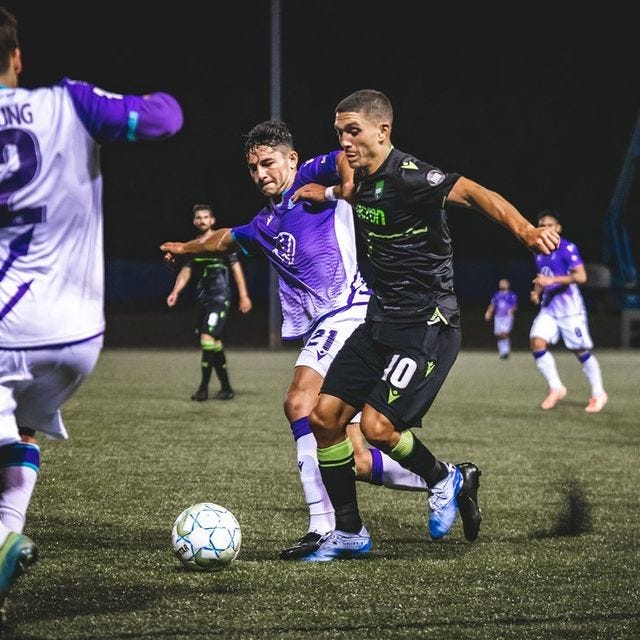
One player you spent a lot of time playing alongside last season: Matthew Baldisimo. What does he do best as a player?
JD: Baldi, I always told him when I’d play with him, “if you’re not yelling at me left and right, we’re going to have problems,” [laughs]. I would always say it to him, just because I know what he possesses on the ball. He’s fantastic on the ball. Great passer; he has vision. And he’ll [join] the attack. He’s a good player. And I just want him to talk a little bit more and be the dictator on the pitch.
I thought he definitely came out of his shell last year. I was trying to give him as much confidence as possible, playing alongside him. And he’s special; he has something in him. You’ve just gotta keep pushing him to get it out and see how far he can take it. But I think he’s taken a massive step, and we all believe in him, for sure.
Sean Young joined the club as a 19-year-old last year. He ended up making nine appearances (51.3 minutes per game) and spent a lot of time beside you. What potential do you see in him?
JD: Sean is another one. I’m always on Sean, because I don’t think he fully knows his potential yet. But the club definitely knows, and the coaches see it all the time. It’s just a matter of him believing in himself and pushing further. He listens to instruction really well. But he is someone that will definitely, if he continues to play like this and takes that next step, he has a bright future. And I really believe that.
It’s his first time in a professional setting, so he just has to get used to certain things. But when it comes to a match and it comes down to just fighting and getting results, doing those little things, he’ll do it. He’ll do whatever he has to do. And in terms of the experience, that’s coming.
He’s young; he’s new to the pro game. But I think he took a massive, massive step last year, because nothing was given to him. At all. Not one thing. I saw when he first came into the club, and guys that were there, there’s a lot of stories, but to see where he finished, that’s another story as well. So he’s done well for himself. He’s just continuing to work and definitely has a bright future.
Part of being a captain is being the coach’s voice on the pitch. What’s your connection like with Pa-Modou Kah?
JD: It’s great, man. He’s very easy to work with, in my opinion. What I like most is he just tells you how it is; it doesn’t matter who you are. I could be making a bad decision in training, and he’ll say it how it is. And that’s what you need. There’s no favouritism with him. It’s just straight up, and we figure it out, and we get on with it. And I think that’s one of the things that helped the team last year—a lot.
Pa is also a guy you can [talk to]. As soon as training is finished and you have questions, it doesn’t matter if the training was good or bad, he’s there to answer them for you; he’s there to help. So that’s what I try to [model with] the boys as well: just to be there to be that support. And so far it’s been great working with him. I prefer to be honest and straight about certain things, and that’s the best way to help somebody—especially in this game. Soccer is very cutthroat at times, and one little mistake from you switching off in 90 minutes can cost you everything.
But it’s been a fantastic journey so far. We’ve just gotta keep it up.
You’ve been able to develop your own coaching skills as well, being tabbed as the head coach of the U-12—and now U-13—Van Isle Wave program. Tell me about that role and what that’s brought to your career.
JD: Yeah, it’s been great working with the boys—especially to see the progress from these twelve-year-olds, and now thirteen-year-olds. We have some young boys, eleven-year-olds, on the team [as well]. But they’ve taken massive steps forward as a group. And just to see that myself and my assistant coach, Jordan DeGraaf, have helped these boys. From where they started to where they are now, it’s impressive.
While coaching, I also realize now, when I go back to the professional environment, when I’m training, you have a different set of eyes on the game. The patience for the game is different, because you understand that some players take a little bit more time to adapt and understand what’s being asked of them. Before, I was like, “I don’t have time to make two, three, four mistakes. One mistake, that should be enough.” But I understand now that it takes time. Some players develop faster than others. Some players listen better than others until they realize what it is. So I think it’s actually helped me in terms of patience with myself and other players.
And another side of it is to teach the boys. It’s just nice, because I get to take things from the first team and implement certain things with [the U-13s]. They’re not going to be perfect at it, but they understand the mindset of what it takes. And also just developing young minds. I think it’s important, and I get great joy from it. So I’m just going to continue along with it and see where it takes me.
At 32, Dixon is the eldest player on Pacific FC’s roster. Callum Irving, 28, is the second-oldest, followed by Victor Blasco (26). Josh Heard, 20, is the youngest player on Pacific’s roster.
De Guzman played for the Ottawa Fury from 2015-16, taking on the captaincy in his final season. In January 2017, he retired and joined the Fury’s coaching staff, first as assistant coach, then interim head coach, then general manager. Dixon played for the Fury from 2016-19.
From 2014-16, Dixon played professionally in Finland, first for Tornion Pallo -47 (Fourth Tier), then JIPPO Joensuu (Second Tier) and FF Jaro (Second Tier), with one appearance for Jakobstads Bollklub (Third Tier).




